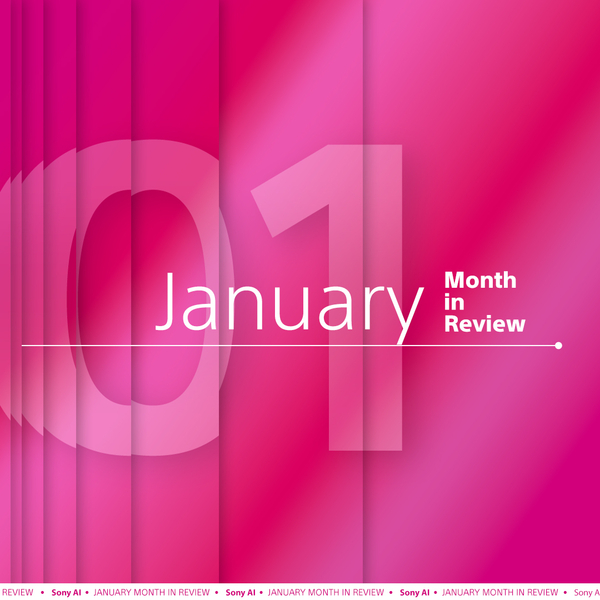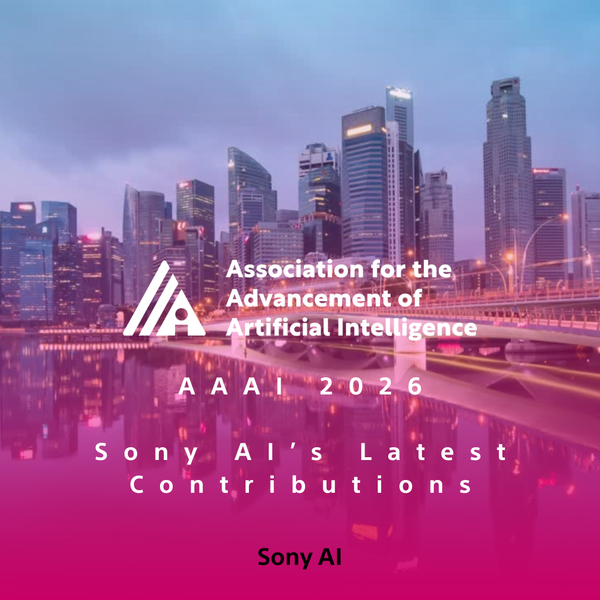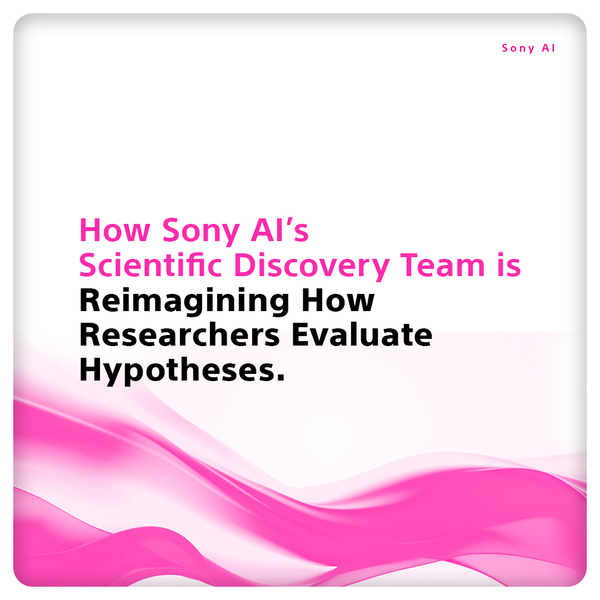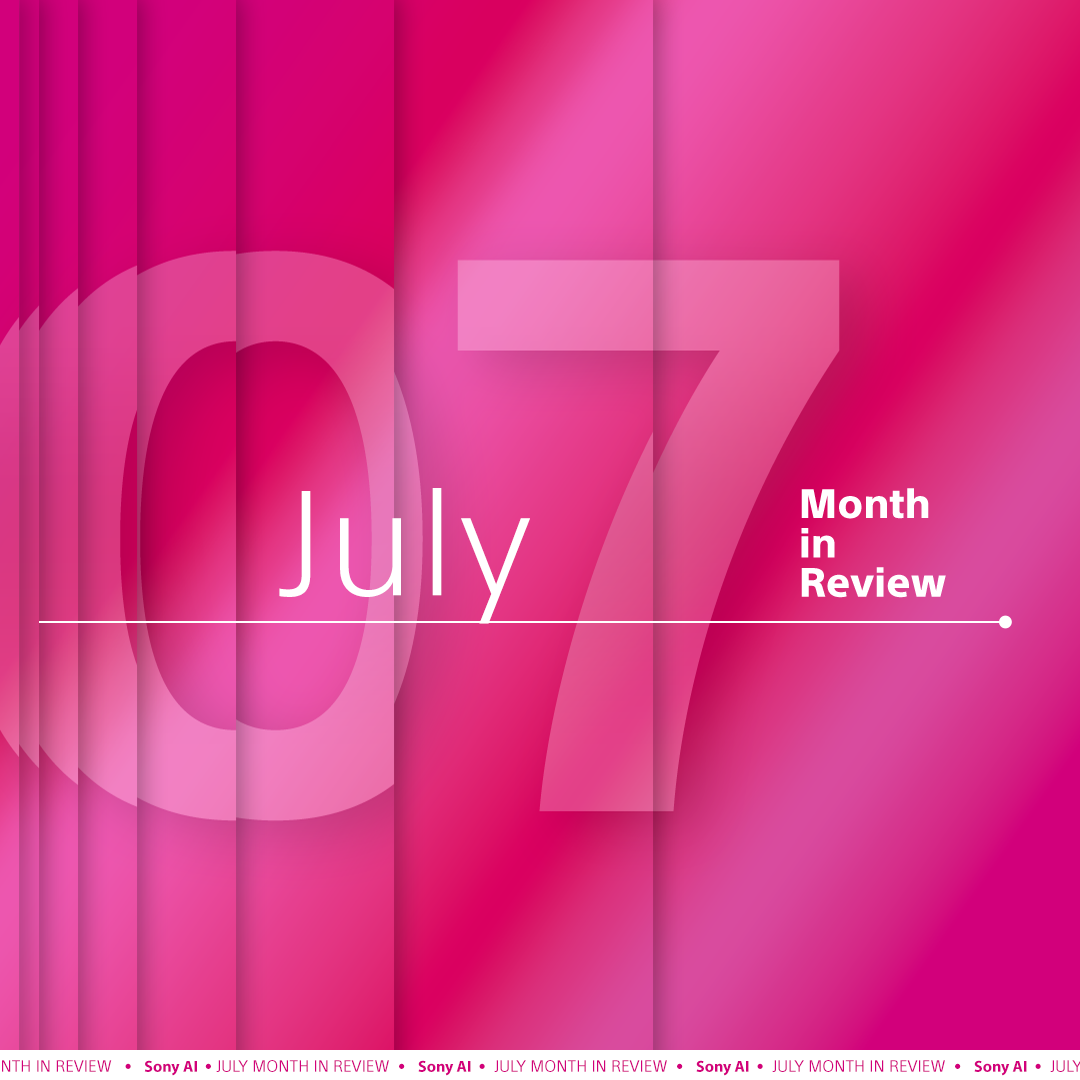Advancing AI: Highlights from July
Sony AI
July 31, 2025
July was a month of cultural fluency, scientific collaboration, and stronger defenses for creators. From innovative translation models presented at ACL 2025 to new tools for health forecasting and reinforcement learning shared at ICML, Sony AI continued its work to build and explore adaptive, responsible, and human-aligned AI systems. Here’s a look at what happened this month across our teams, labs, and global stages.

AI for Health & Hypothesis Generation
Featured at AI4X 2025
At AI4X, Sony AI shared two projects that bring science and health into sharper focus:
- -Literature-Based Hypothesis Generation (THiGER-A): A model that treats scientific literature as a temporal graph, predicting not only what’s been missed but why it might matter. It aims to assist researchers in identifying testable gaps in the research landscape.
- -The Gastro-Health Project: A personalized nutrition platform that factors in drug–food interactions, mood, and real-time biomedical insights to offer tailored health recommendations. Think of it as food forecasting for preventive care.
Read the full blog: Scientific Discovery: How Sony AI Is Building Tools to Empower Scientists and Personalize Health at AI4X 2025
ICML 2025:
Reinforcement, Generative Modeling, and Defensible AI
July 13–19 | Vancouver
Sony AI made a strong showing at ICML with papers on:
- -Di4C: A faster, scalable way to train discrete diffusion models by capturing dimensional correlations.
- -Proto Successor Measure: Enables agents to solve unseen tasks without retraining, by learning a reusable task space.
- -TRIM: A method to detect and suppress IP-infringing content in visual generative models.
- -CLEWS: A new approach to track musical attribution in short audio clips using weakly labeled data.
- -HSN: Hyperspherical normalization that stabilizes training for deep RL agents by eliminating magnitude variation.
Explore the full roundup: Sony AI at ICML: Sharing New Approaches to Reinforcement Learning, Generative Modeling, and Defensible AI
ACL 2025:
Building More Inclusive Translation Systems
Sony AI researchers tackled two real-world translation challenges:
- -IdiomCE: Uses graph neural networks to preserve figurative meaning in idioms across Indian languages—bridging cultural context, not just words.
- -Bandit-Based Translation for African Languages: Applies reinforcement learning to dynamically select the best translation model, improving performance even when reference data is scarce.
Together, these papers present a vision for machine translation that listens before it speaks.
Dive into the research: New Research at ACL 2025 Tackles Real-World Translation Challenges – Sony AI
Sights on AI:
Lingjuan Lyu Q&A on Privacy, IP, and the Future of Edge AI
July 8, 2025
In this month’s Sights on AI, Lingjuan Lyu reflects on her path from watermarking to federated learning, and what’s next in privacy-preserving machine learning.
She discusses:
- -The evolution of privacy and IP protection post-transformer era.
- -Why federated learning is crucial for visual generative models.
- -The story behind Sony AI’s Argus VFM series, including CVPR-recognized research on compact diffusion training.

Improving RL Stability with Hyperspherical Normalization
From ICML 2025, by Hojoon Lee, Youngdo Lee, Takuma Seno, Donghu Kim, Peter Stone, and Jaegul Choo
Training reinforcement learning agents can get messy, especially in complex environments. Popular methods like PPO and SAC are powerful, but they often struggle with unstable learning dynamics as models scale up.
This research identifies a hidden culprit: inconsistent feature magnitudes during training. The team introduces Hyperspherical Normalization (HSN): a simple, plug-and-play method that constrains features to a fixed norm. By focusing only on directional information, HSN helps reduce variance and stabilize learning.
This payoff offers a more stable, better-performing model that generalizes well across tasks, from locomotion to robotic manipulation. It’s a small geometric tweak with big implications for scalable RL.
Dive into the research:
Hyperspherical Normalization for Scalable Deep Reinforcement Learning – Sony AI
Discover our ICML research discoveries here:
Sony AI at ICML: Sharing New Approaches to Reinforcement Learning, Generative Modeling, and Defensible AI

ACM Highlights Peter Stone’s Accomplishments in AI
Following the presentation of the AAAI Allen Newell Award to Sony AI’s Chief Scientist Peter Stone in May, the Association for Computing Machinery (ACM) showcased his career and contributions to AI, particularly in reinforcement learning – including GT Sophy – multiagent systems, and robotics in a new video.
Peter Stone Participates in AAAI Presidential Panel Discussion
Peter Stone recently participated in a panel organized by the Association for the Advancement of Artificial Intelligence (AAAI). Alongside his colleagues, Stone discussed his perspective on the perception of and hype around AI versus the reality of the technology and its impact.
GT Sophy Races into the Spotlight This Month
As part of the 1.61 update, Polyphony Digital Inc. has introduced a new track compatible with GT Sophy in Gran Turismo® 7: High Speed Ring. Players can access the latest track to race against the AI agent in PlayStation®5 through 'Quick Race' and 'Custom Race'.
Interview with Kaushik Subramanian, Senior Staff Research Scientist at Sony AI
In addition to the new track released for GT Sophy this month, Traxion.gg recently published an article stemming from an interview with Kaushik Subramanian, Senior Staff Research Scientist at Sony AI.
Kaushik spoke with Traxion’s Tom Harrison-Lord about the availability of the AI agent in ‘Custom Race’, which was introduced earlier this year. Players are now able to tailor their experience with GT Sophy 2.1 across tracks, car tuning, and certain behaviors.
Yuki Mitsufuji Sits Down with AIhub’s Lucy Smith to Discuss SoundCTM
Following the presentation of the paper SoundCTM: Unifying Score-based and Consistency Models for Full-band Text-to-Sound Generation at ICLR, Yuki Mitsufuji, Lead Research Scientist at Sony AI, spoke with AIhub’s Lucy Smith about the research.
The interview touched on the problems with the existing text-to-sound generators and how the team was trying to solve them with SoundCTM. Including, how the team developed the model, and the results of the model’s evaluation.

On the Horizon: Where to Find Us in August
July may be wrapping up, but the momentum continues in August. Sony AI will be sharing new ideas, research, and creative tools at three major global conferences:
- -SIGGRAPH 2025 (Aug 10–14, Los Angeles, CA)
Join Sony as we explore the intersection of generative AI, graphics, and interactivity—where creativity meets computation. - -Interspeech 2025 (Aug 17–21, Vienna, Austria)
Our researchers will present new work on audio generation and speech alignment, highlighting progress in personalized and privacy-conscious voice technologies. - -Deep Learning Indaba 2025 (Aug 17–22, Dakar, Senegal)
We’ll share approaches to inclusive AI and low-resource learning, contributing to a more equitable global research ecosystem. 
- Connect with us on LinkedIn, Instagram, or X, and let us know what you’d like to see in future editions. Until next month, keep imagining the possibilities with Sony AI.
Latest Blog

February 2, 2026 | Sony AI
Advancing AI: Highlights from January
January set the tone for the year ahead at Sony AI, with work that spans foundational research, scientific discovery, and global engagement with the research community.This month’s…

January 30, 2026 | Sony AI
Sony AI’s Contributions at AAAI 2026
Sony AI’s Contributions at AAAI 2026AAAI 2026 is a reminder that progress in AI isn’t one straight line. This year’s Sony AI contributions span improving and enhancing continual le…

January 26, 2026 | Sony AI
How Sony AI’s Scientific Discovery Team is Reimagining How Researchers Evaluate …
In today’s research landscape, thousands of scientific papers are published each day; a metaphorical sea of knowledge. Even domain experts struggle to keep up. As Pablo Sánchez Mar…







